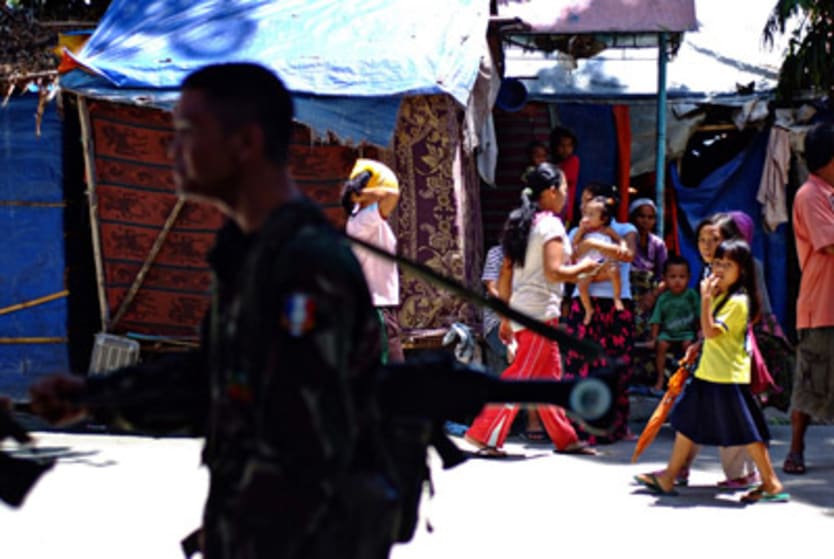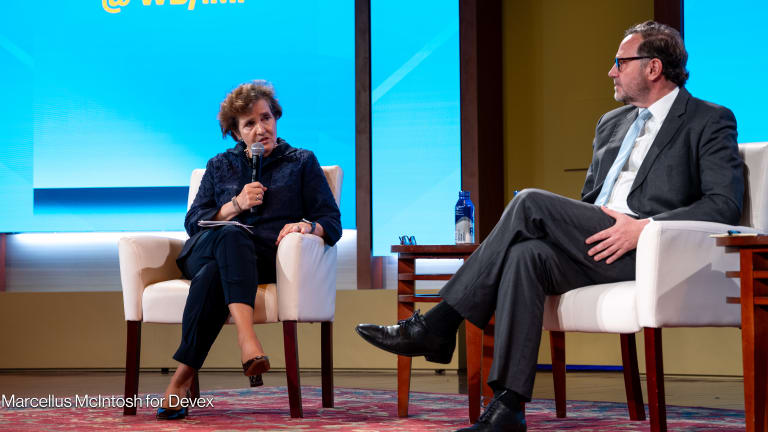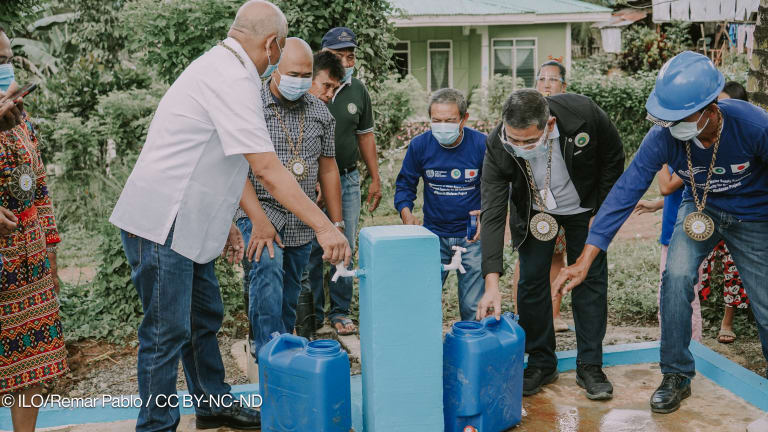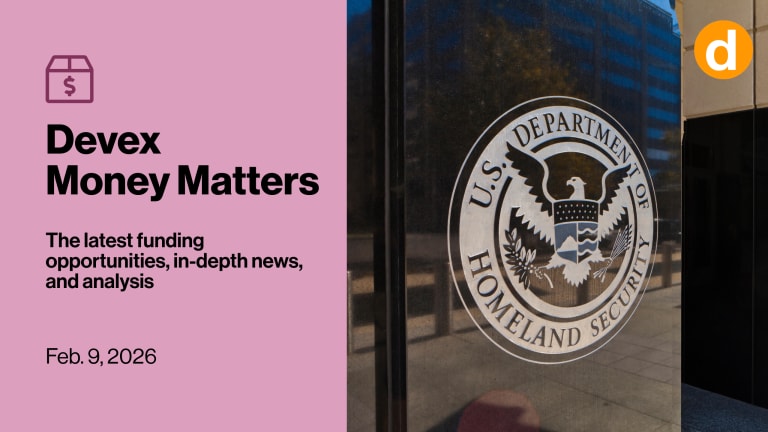
In the festival that is Philippine elections, presidential contenders are spending billions to broadcast traditional promises to voters on prime-time TV and full-page newspaper ads: “I will not cheat. I will not be corrupt. I will lift you out of poverty.”
That such promises are still made generations since the Philippines became a democracy in 1946 is quite telling of how much the country has progressed. From among Asia’s brighter spots, the lights have gone dim on its corner of the Pacific, fading beside the likes of Singapore, Thailand and even Vietnam.
It seemed almost irrelevant that the country graduated from low-income to lower-middle income status at the turn of the year. Roughly a third of 92 million Filipinos continue to live below the poverty line, a figure that is at least twice the poverty level in neighboring Thailand, Indonesia and Vietnam.
Still, the Philippines’ compelling development needs have kept international donors in the country despite the government’s record of corruption, perennial delays in foreign-assisted projects, and frequent personnel changes.
As the Philippines prepared for general elections on May 10, foreign donors were in wait-and-see mode, concerned over the country’s poor indicators on education, health and economic growth, and its vulnerability to the effects of climate change.
At the same time, donors have been reducing aid to the Philippines as the country took baby steps on these indicators, said Alistair MacDonald, the European Union’s ambassador to the Philippines. But growth seemed to benefit just a few, he said; development has yet to trickle down to the poor.
“Increasingly, the problem in the Philippines is the problem of distribution, rather than an absolute problem of development,” MacDonald argued.
Assistance levels have been decreasing along with donors’ shifting priorities, but the Philippines’ longtime multilateral and bilateral partners remain in the country, still parrying criticism that development assistance has chained the Philippines to debt repayment.
Bottom-dweller
The Philippines lost its position as an emerging economy in Southeast Asia in the last four decades, said Titon Mitra, minister counselor for the Australian Agency for International Development.
“If you see the Philippines, Thailand, Vietnam [and] Malaysia in the ’70s or before the ’70s, the Philippines was sitting at the top, and these countries were ranked below. And then now, it has gone completely the other way,” Mitra said. “The Philippines is now sitting at the bottom of the pile, just above Cambodia and Laos. That’s why we’re here, and we’ll be here for a while.”
That decade was a time when the Philippines, just 30 years since its liberation from centuries of foreign rule, fell under the repressive regime of Ferdinand Marcos, whose family was accused of plundering the state treasury.
In the years that followed Marcos’s overthrow, a string of events shaped the country’s development trajectory: coup d’etats, people-led revolts, communist insurgency in the highlands, and secessionist movements in the south.
Now, at the threshold of another regime change, the Philippines languishes in a state of stunted growth. Public confidence in government remains low, and investor confidence continues to see-saw.
Mitra conceded that foreign aid could only do so much. Development, after all, depends on a strong leadership to steer the country toward a track of inclusive growth.
“For the Philippines to take that leap forward, it needs factors which are beyond the power and ability of donors to support,” he said. “So, it needs very strong leadership, it needs the commitment to reform, it needs to tackle some fundamental issues around corruption, transparency and accountability.”
The Philippine economy has suffered from an underdeveloped manufacturing industry, and the promise of the country’s agricultural sector is limited by fickle policy and scarce investments on agrarian reform, agricultural technology and infrastructure. Dwindling education indicators and discouraging rates of student attrition from elementary school to college also threaten to inhibit the growth of foreign-owned outsourcing firms in the country, among them call centers, transcription and telemarketing firms that absorb much of the young workforce.
Red flags for donors: Frequent personnel changes within key government departments delay both loan and grant projects, with every new leader tweaking agency priorities. Often, the result has involved cost overruns in donor-funded projects.
Aid slashed, frozen or refocused
After international support for the Philippines reached a crest in the ‘90s, donors cut aid toward the turn of the millennium as attention shifted to urgent humanitarian needs in Africa and poorer Asian nations.
Data compiled by the Philippines’ National Economic Development Authority show that the country’s stock of foreign loans, for instance, decreased from $13.3 billion in 2000 to $10 billion in 2008. That said, measuring the size of annual assistance is difficult, since most loans and grants cover multiple years, and the effects of inflation and foreign exchange discrepancies are hard to calculate.
“What I notice, if you talk about trends, is that if you compare [official development assistance] to the [national] development budget, it’s been shrinking,” said Roderick Planta, NEDA’s project monitoring chief. “But that’s only if you use simple arithmetic: Your stock of loans doesn’t change much while the national budget is increasing.”
Japan, the world’s largest bilateral lender, remains one of the Philippines’ top sources of foreign aid, but both grant and loan allocations have been decreasing over the years. The Philippines’ stock of Japanese loans was $4.17 billion in 2008, according to NEDA figures; grants amounted to $6.92 million in 2006 – approximately 10 percent of 2001 figures.
Floro Adviento, Manila manager of the Japan International Cooperation Agency’s loan program, noted that the amount of new loans per year has decreased as well.
“I think that’s because of the policy of the Japanese government to focus assistance to Africa,” Adviento said. “I guess in the coming years, as we are normalizing, it will steadily go up again and, hopefully, we will attain levels of five years ago. It used to be that loans were around $1 billion a year. Now, that has decreased.”
U.S. military and civilian development assistance has been at steady levels of around $130 million annually, more than half of which is spent on stabilization efforts in the country’s restive Mindanao region.
Grants from the European Union and Australia fell over the last decade, but officials predicted the numbers to rise again. Australia is now the Philippines’ largest bilateral source of grants, with its aid agency spending an average of A$120 million (approximately $110 million) a year on projects focusing on basic education, health, microfinance and government capacity building in fiscal policy and good governance.
“What you see over the last decade is that we’ve actually doubled our aid program and so we’ve increased significantly recently,” AusAID’s Mitra said. “So, I would anticipate that we would be probably at that level for some time. What’s interesting with these levels is that now, we are the single largest grant aid donor in the Philippines.”
The EU is also poised to ramp up aid after cuts in the past decade. MacDonald said the EU’s Philippine funding will increase again in the coming years, to 23 million euros ($31.5 million), a level close to funding peaks in the early ‘90s.
Private donors turning away
Money from private donors has been coming in at a slower pace, prompting Philippine civil society organizations to seek more creative ways to raise funds for their causes.
“It was really more of a graduation rather than a punishment, in the sense that [foreign donors] have really been here a long time,” said Mayen Cabral, a former fundraising officer with UNICEF Philippines.
The trend appears to be true regionally, according to Cabral, who now serves as executive director of Ventures Asia, a fundraising consultancy based in Manila. Donors have shifted funding from Asia to Africa, she said, citing a study of the Singapore-based International Development Research Center.
The Philippines is home to one of the world’s most advanced civil society movements, with at least 300,000 known non-governmental and people’s organizations carrying political or sectoral causes. These groups are slowly learning to adapt, said Cabral, whose firm has advised foundations across Asia on effective fundraising.
“There are still organizations that are praying the novena that funding organizations would come back. There are those still in denial,” she said. “In the meantime, it’s challenging their organizations. [But] to anchor their strategy on waiting for these funding organizations to come back will be irresponsible.”
A focus on governance
Corruption has long been a black eye for the Philippines and is so well-entrenched in society, it could be as petty as settling a traffic ticket or as high-level as multimillion peso kickbacks from government contracts.
Noting this weakness, foreign donors have been implementing initiatives to reform critical government departments, especially in corruption hot spots like the customs and tax bureaus.
USAID wrapped a two-year anti-corruption program in 2009 and is keeping watch of corruption indicators, said Myra Stokes, the agency’s program resources management chief in Manila.
“Corruption is an area we try to work on, and we work with different government agencies in our governance program, and of course with the [Bureau of Internal Revenue] and the [Bureau of Customs],” she said. “But it doesn’t hinder us from working with government. They’re still our partners.”
Aware of the Philippines’ corruption record, Australia has been practicing stringent measures to prevent losing development funds to corrupt officials or non-governmental organizations.
“The opportunity for corruption as far as Australian aid funds is extremely limited,” said AusAID’s Mitra. “But, that said, there is a view that the Philippines is quite corrupt, and certainly the international perception would certainly rank the Philippines quite low in terms of [arresting] corruption, and it’s mixed.”
Donors have been investing in initiatives to ensure smooth national elections. USAID, AusAID and the EU separately implemented initiatives on voter education, election monitoring, election adjudication reform and media training through partnerships with the Philippines’ Commission on Elections and election watchdogs.
Mitra explained: “The intention there is to make sure that there’s credible and fair elections which, if that takes place, will be very beneficial to the Philippines, because it will build international confidence in the system. Therefore, it will result in stronger investments.”
The promise of change
Despite the many roadblocks, donors are hanging on to hopes that the Philippines will realize a vision shared around the globe: good governance, an educated and healthy population, happy households, and a strong economy. While independence from foreign aid may not be an immediate prospect, donors still see a silver lining.
“So the big question now is,” said Mitra,” will the government be able to take the steps to put [the country] back on a positive trajectory? There are some big issues that the Philippines has to tackle. Let’s see what the new administration brings and the extent to which they’re really going to tackle those issues.”
MacDonald, for one, remained confident in the Philippines’ future.
“If you want me to be courageous,” the EU ambassador said, “I could say that with the right policy, the Philippines will not be an aid recipient within 10 to 12 years. And the right policy means having the proper policy but also the proper funding. The national budget must be more effectively used.”
It’s a call the international community as well as the Philippine political elite should heed.
Search for articles
Most Read
- 1
- 2
- 3
- 4
- 5








